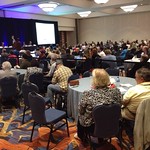 In the last couple of years, conferences have been adopting codes of conduct for their speakers and participants. The code of conduct ensure that everyone understands that there are boundaries that determine was is acceptable in terms of behavior. Yes, speakers can be inappropriate and participants can be inappropriate...and by doing so, create an atmosphere that isn't conducive to learning and building positive professional connections.
In the last couple of years, conferences have been adopting codes of conduct for their speakers and participants. The code of conduct ensure that everyone understands that there are boundaries that determine was is acceptable in terms of behavior. Yes, speakers can be inappropriate and participants can be inappropriate...and by doing so, create an atmosphere that isn't conducive to learning and building positive professional connections.In July 2013, John Scalzi said that he would no longer speak at conferences that did not have a code of conduct. It may not be practical for all of us to avoid conferences that do not have a code of conduct, but I think we should raise the issue with them and get them to adopt one. There are plenty of examples (see some below), so a conference does not have to start from scratch. It might also be worthwhile for conference participants to circulate a petition, if they feel that the conference organizers need a bigger push to implement a code of conduct.
Finally, I encourage you to talk to your conference colleagues about what acceptable behavior is at the conference, and promise to point out to each other when you may be acting or speaking inappropriately. Yes, that could be uncomfortable, but it would help to educate all of us about an issue that needs our attention.
Resources:
- Here's What to Include in Your Meeting's Harassment Policy, http://www.pcma.org/convene-content/convene-article/2013/12/08/here%27s-what-to-include-in-your-meetings-harassment-policy
- SLA Anti-Harassment Policy, http://www.sla.org/attend/2014-annual-conference/general-info/anti-harassment-policy/
- Statement of Appropriate Conduct at ALA Conference, http://alamw14.ala.org/statement-of-appropriate-conduct
- DRAFT SAA Code of Conduct, http://www2.archivists.org/news/2014/call-for-member-comment-on-draft-saa-code-of-conduct
- Anti-harassment work: Conference anti-harassment policy, https://adainitiative.org/what-we-do/conference-policies/
- O'Reilly Conferences: Code of Conduct, http://www.oreilly.com/conferences/code-of-conduct.html
- PyCon 2013 Code of Conduct, https://us.pycon.org/2013/about/code-of-conduct/
- UN: What is sexual harassment? http://www.un.org/womenwatch/osagi/pdf/whatissh.pdf
No comments:
Post a Comment